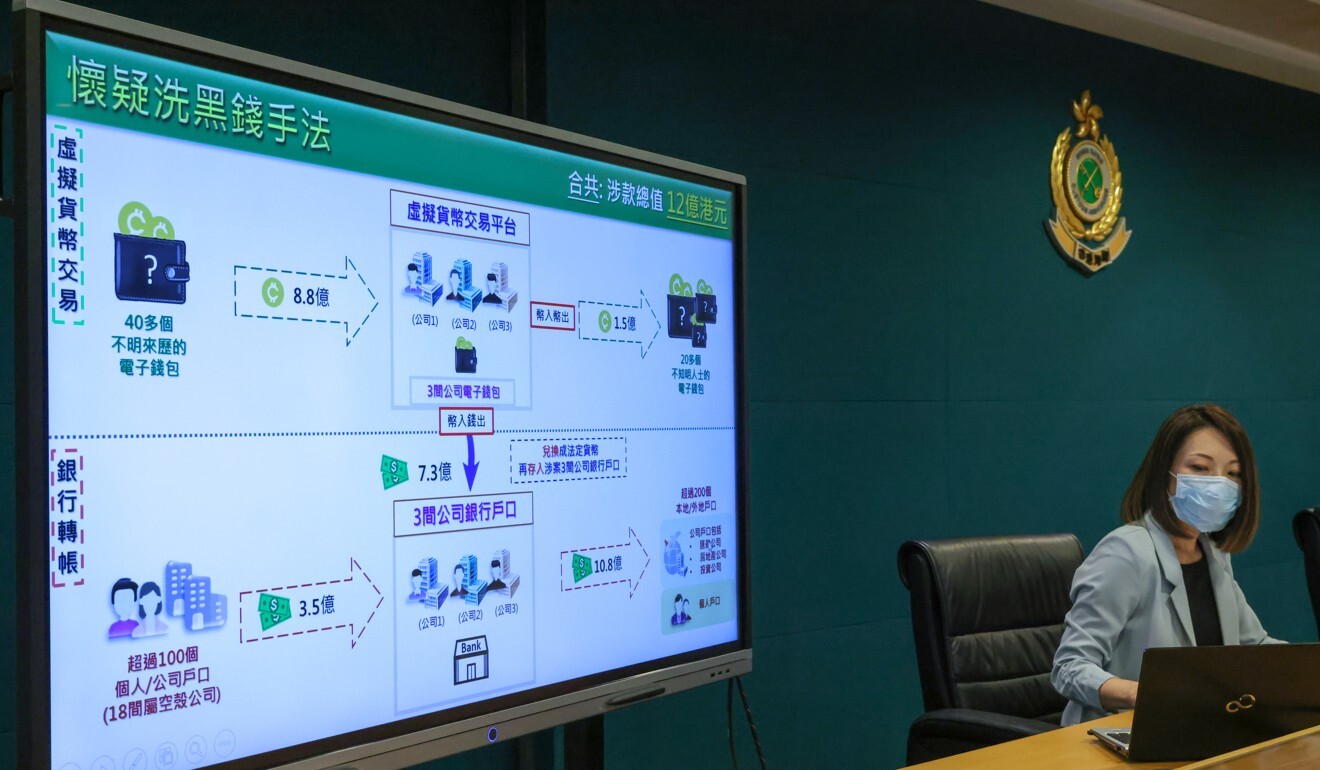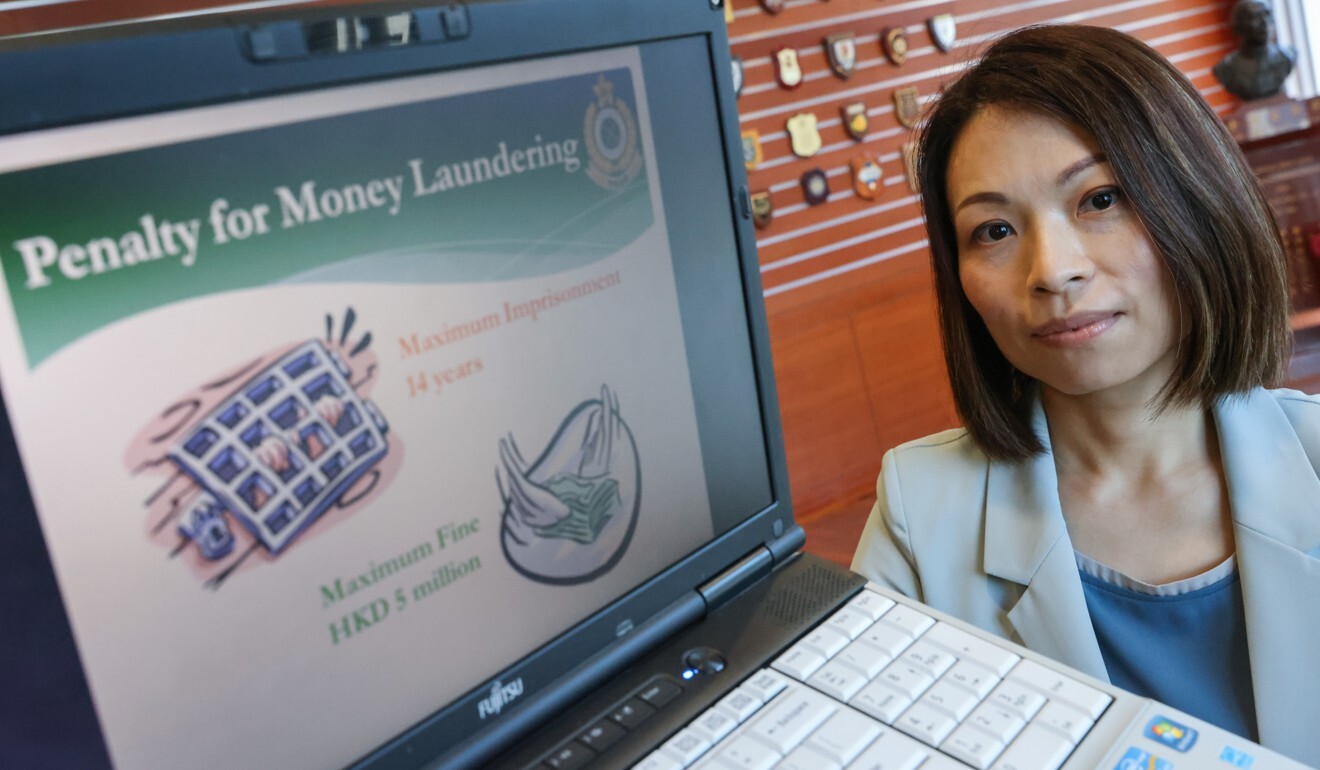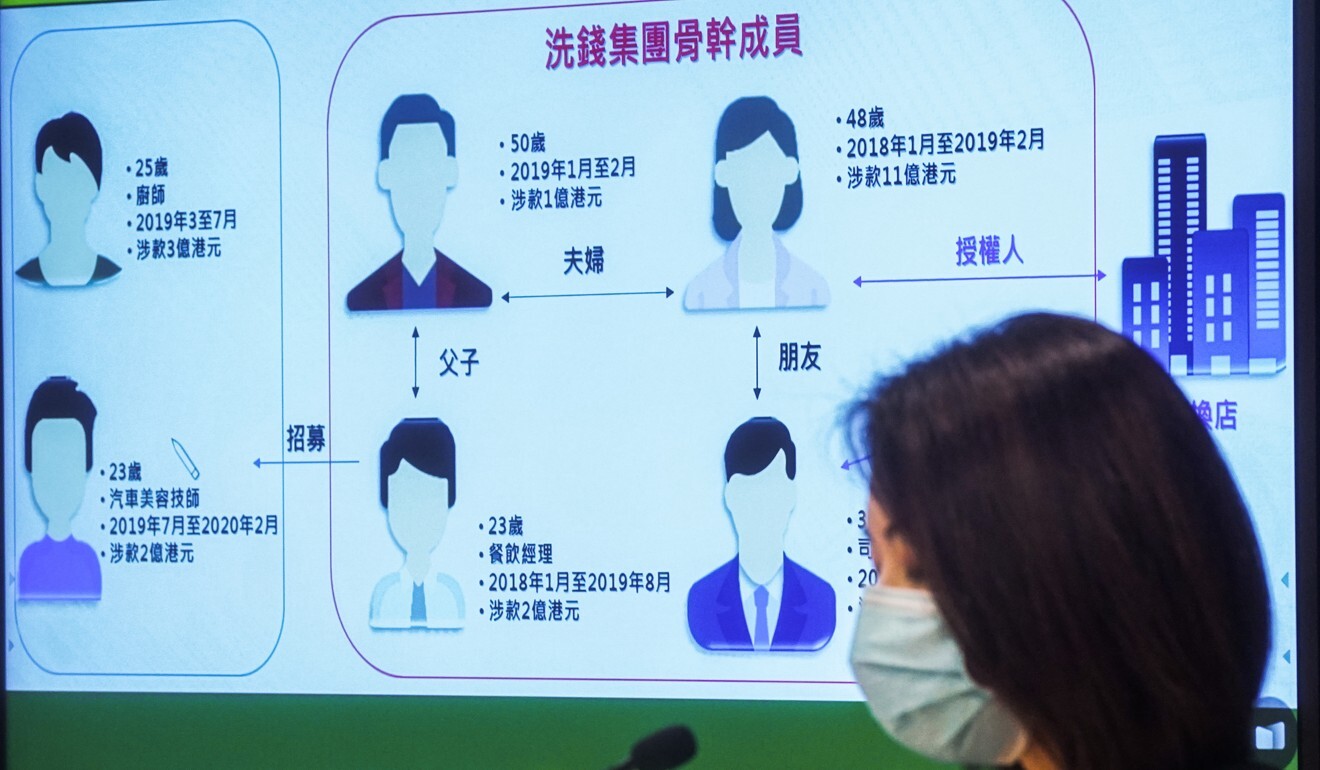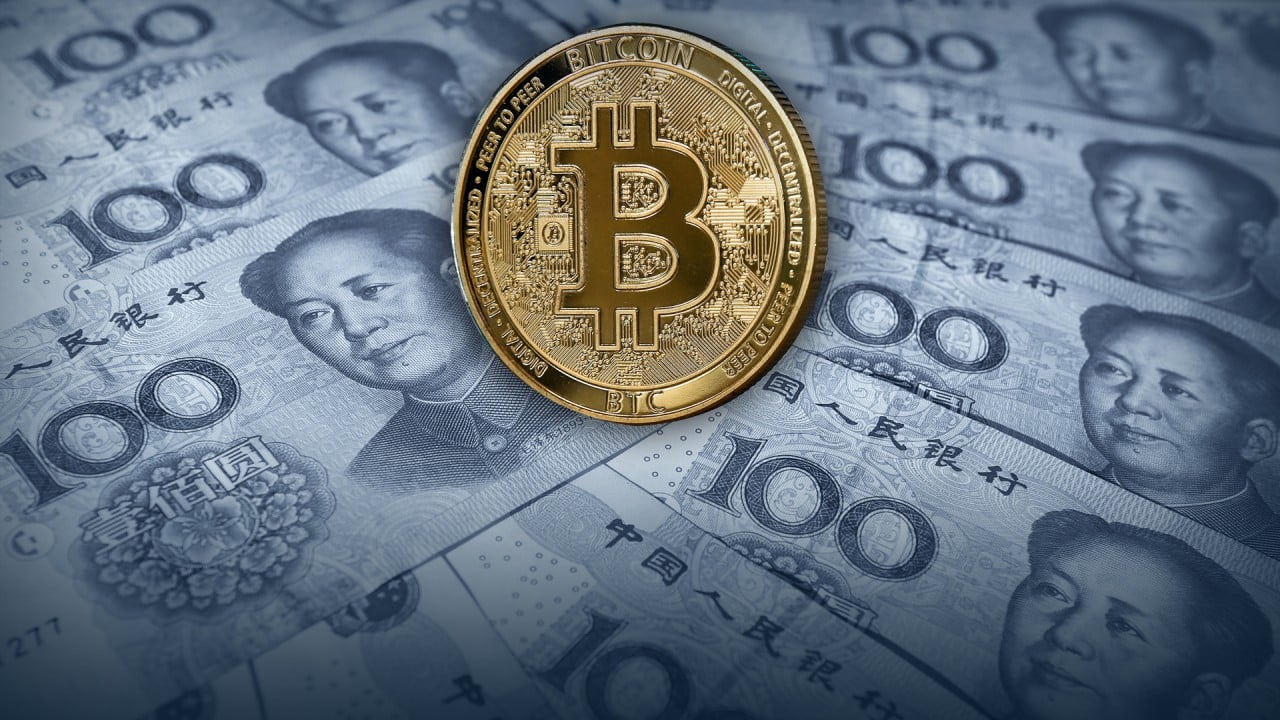
Hong Kong’s dirty money sleuths track criminals using cryptocurrency trading platforms to move illegal funds across borders
- Money launderers attracted by anonymity, speed of cryptocurrency transactions across borders
- Law enforcers step up surveillance as Hong Kong prepares to amend dirty money legislation
Hong Kong authorities linked cryptocurrency and money laundering for the first time in July, when a customs team shut down a syndicate suspected of moving illegal funds totalling HK$1.2 billion (US$154.1 million).
The alleged ringleader and three others were arrested on suspicion of running a racket from February last year to May this year, using three shell companies that opened electronic accounts to trade in so-called stable coins issued by the cryptocurrency Tether.
The syndicate is believed to have used the cryptocurrency to launder about HK$880 million between last December and May, and employed more conventional methods to pass a further HK$350 million of dirty money through eight bank accounts.

Superintendent Grace Tang Wai-ngan, head of customs’ financial investigation group, said a suspicious transaction in the bank account of one of the shell companies provided the only clue initially.
After spending about three months analysing the records of numerous transactions in banks and a cryptocurrency trading platform, the team uncovered two more shell companies.
“My colleagues had to sift through thousands of related transactions to identify the laundering patterns before finding more than 1,800 suspicious transactions in the banks and about 500 cryptocurrency transactions between the three firms,” she said.
The team then put its targets under round-the-clock surveillance for two more months before making the arrests.
Tang said law enforcement agencies worldwide had noticed the rise of money-laundering activities involving virtual currencies in recent years.
Some features of international cryptocurrency services, especially the pervasive anonymity of the parties involved, make them ideal for criminals to move dirty money through financial systems and across borders.
“The use of cryptocurrencies can help criminals conceal the identities of the buyer and seller of digital money in transactions and hide the origin, flow and final destination of illegal proceeds,” Tang said.
Cryptocurrency trading requires people to set up electronic wallets that are used to store different types of digital money, with the owners given public and private keys to control their wallet and carry out transactions.
“Given the anonymity and confidentiality of cryptocurrency wallet addresses, criminals might take this feature to place the proceeds from crime into legitimate financial markets by trading cryptocurrency to evade detection by law enforcement agencies,” Tang said.
“Syndicates may either complete these transactions by peer-to-peer means or by recruiting third parties as stooges for money laundering.”

Suspicious transactions on the rise
According to the latest data posted on the website of Hong Kong’s Joint Financial Intelligence Unit staffed by police and customs officers, reports of suspicious financial transactions, including those with suspected links to conventional money laundering or terrorist financing, rose by 10.7 per cent to 57,130 last year from 51,588 in 2019.
More than 38,900 such transactions were reported in the first eight months of this year.
Hong Kong customs investigators deal with money laundering linked to offences such as smuggling, copyright infringement, drug trafficking, unfair trade practices and money service operators, while police handle cases related to crimes such as deception, investment fraud, bookmaking, illegal gambling, extortion, and loan shark and vice activities.
Last year, customs officers arrested 38 people in nine cases involving HK$4.6 billion and froze bank accounts with more than HK$70 million suspected of being the proceeds of criminal activities.
Last September, in the biggest case of its kind, they arrested five members of a family accused of laundering more than HK$3 billion through more than 100 personal bank accounts. The owner of a money exchange was also arrested.
In the first eight months of this year, they arrested 21 people in eight money-laundering cases involving about HK$3.9 billion.
In one case in April, a couple and their son were among six people arrested on suspicion of laundering about HK$2.5 billion through 59 bank accounts over two years.

Police handled 1,090 money-laundering cases in 2020, slightly fewer than the 1,158 the year before.
In January this year, they arrested seven current and former Hong Kong bankers in a crackdown on an international money-laundering syndicate alleged to have handled HK$6.3 billion in criminal proceeds over four years – the city’s biggest such case in nearly a decade.
Police said the syndicate sent 16 people – mainly Belgians and mainland Chinese – to Hong Kong to open business accounts for money laundering.
Money laundering carries a maximum penalty of 14 years in jail and a HK$5 million fine.
Changes to law coming up
According to various online sources, there were more than 5,800 cryptocurrencies worldwide and about 75 million wallet users last month.
There are believed to be hundreds of exchanges or trading platforms globally, but the exact number is unknown as they do not need to register with any centralised authority.
In March, Secretary for Financial Services and the Treasury Christopher Hui Ching-yu told the legislature that virtual currencies were not legal tender and not recognised as a means of payment in Hong Kong.
The city has begun exploring ways to regulate cryptocurrency trading in line with the Financial Action Task Force (FATF), an intergovernmental body established in 1989 that sets international standards to combat money laundering and terrorist financing.
In February 2019, the task force recommended subjecting virtual asset services providers – the cryptocurrency exchanges and trading platforms – to the same range of anti-money-laundering and counterterrorist financing obligations applied to financial institutions and other businesses and professions.
Hong Kong is part of the task force, which wants member jurisdictions to implement measures to prevent the platforms from being abused by criminals.
Among other things, the platforms should be required to identify and verify customers, keep records on customer identification and transactions, and identify and report suspicious transactions.
The Hong Kong government has proposed introducing a licensing regime for operators of centralised virtual asset trading platforms and requiring licensees to offer services only to professional investors.
Under the proposal, anyone who wishes to run virtual asset trading platforms in Hong Kong must obtain a licence from the Securities and Futures Commission and be subject to the full range of anti-money-laundering and counterterrorist financing obligations applicable to other financial institutions in the city.
Following a three-month consultation, the Financial Services and the Treasury Bureau said in May there was broad support for the proposals and the government would proceed to amend the Anti-Money Laundering and Counter-Terrorist Financing Ordinance and put the bill before the legislature by next year.

Crooks change methods swiftly
A law enforcement source told the Post that cryptocurrency appealed to criminals with dirty money at every stage of laundering.
To start trading in cryptocurrency, a person has to set up a personal online wallet to store different types of digital money and will receive two keys to control the wallet and carry out transactions.
The public key works like an email address shared with others so that they can transfer virtual coins to the e-wallet. The private key works like a personal password that restricts access to the e-wallet.
Neither key identifies the holder of the e-wallet, as both are made up of garbled characters, numbers and symbols.
Those who own cryptocurrency can do transactions by dealing directly with each other peer to peer, or by going through cryptocurrency exchanges or platforms.
There are a dozen or so cryptocurrency exchanges or platforms with offices in Hong Kong. To carry out transactions this way, cryptocurrency owners open e-wallet accounts with the platforms.
“Criminals can go online to set up cryptocurrency wallets using bogus information to conceal their identities because there is no legislation to regulate them and no genuine personal data is required,” the source said.
In the first stage of money laundering, known as placement, criminals take fewer risks when they use the proceeds of crime to buy virtual coins that they then put through the cryptocurrency exchange or trading platform.
The second stage, known as layering, is when syndicates move money between accounts to make it hard for law enforcers to trace the funds to the original source.
“The anonymity afforded by using virtual coins can obfuscate the origin of a transaction and make it nearly impossible to track,” the source said.

06:54
Is cryptocurrency too risky for China?
The final “integration” stage is when the laundered money is returned to the criminals with the funds appearing to have been earned legitimately.
The source said law enforcers and bank staff would be able to tell when virtual coins were converted into cash via trading platforms.
“But the money launderers could cash out through peer-to-peer transactions with individual traders rather than the platforms,” he said.
Criminals depositing large sums in a bank could be asked to explain how they obtained the money, but the nature of trading in cryptocurrencies such as bitcoin – where values can rise astronomically and crash just as dramatically – has provided them a ready explanation for their wealth.
Another source said money launderers were always ready with explanations for their illegal funds. “They provide records of bogus business transactions issued by their shell companies in other countries, making our investigations difficult,” he said.
Although there could be a clue when criminals converted virtual coins into cash, the speed at which cryptocurrency transactions were made meant that by the time law enforcers noticed and began tracking, the funds might already have been funnelled out of the city and through several countries.
Customs superintendent Tang said the anonymous e-wallet addresses made it difficult to identify senders and recipients in cryptocurrency transactions, and tracing the sources was tedious, time-consuming work.
“Customs will strengthen cooperation with international organisations, including the World Customs Organisation, Financial Action Task Force and Egmont Group, to make use of the global network and enhance intelligence sharing among members for anti-money-laundering work,” she said.
Customs officials would also liaise closely with financial institutions and cryptocurrency trading platforms to screen and monitor transactions, while keeping abreast of the latest developments in financial markets.
Given the more complex methods emerging in money laundering, customs officials would also adopt the latest investigative techniques to gather evidence, including forensic accounting and computer forensics.
Tang added that it was too early to say if the use of cryptocurrency would overtake conventional money-laundering methods.
“Money launderers always explore different tools to wash their dirty money and avoid detection,” she said. “Once the amended ordinance is in place and advanced technology is developed to help trace laundering patterns and identify cryptocurrency wallet owners, they may switch to other tools.”
Police said that as financial crimes had become more complex and diverse, the force set up the Financial Intelligence and Investigation Bureau in June with 225 officers to tackle money-laundering and terrorist financing activities.
“The force will continue to engage its counterparts to explore opportunities for conducting joint operations and recovering assets dissipated abroad, with priority to investigating complex and large-scale money laundering involving professional syndicates operating across borders,” a police spokesman said.
“Police will also seek to harness advanced technologies such as big data analysis, data mining analytics and artificial intelligence, such that it can produce intelligence outputs of a higher quality to support the modern-day need of law enforcement.”

